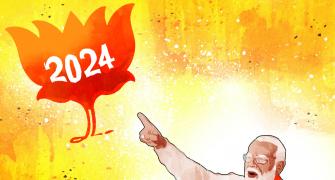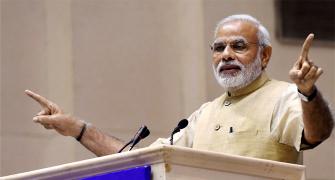India's merchandise exports rose by 1 per cent to $34.99 billion in April even as the trade deficit widened to a four-month high of $19.1 billion during the month, according to government data.

Healthy growth in sectors such as electronics, chemicals, petroleum products and pharmaceuticals has helped register growth in exports despite global economic uncertainties.
Imports also increased by 10.25 per cent to $54.09 billion in the month under review from $49.06 billion in April 2023 due to a significant jump in gold imports.
Imports of precious metals more than doubled to $3.11 billion in April this year.
Crude oil imports rose 20.22 per cent to $16.5 billion.
 Trade deficit, or the gap between imports and exports, in April 2023 stood at $14.44 billion.
Trade deficit, or the gap between imports and exports, in April 2023 stood at $14.44 billion.
The previous high in the deficit was recorded in December 2023 at $19.8 billion.
In March 2024, the outbound shipments dipped to $41.68 billion from $41.96 billion a year ago.
Briefing media on the data, commerce secretary Sunil Barthwal said the figures show that the new fiscal year started on a good note and hoped that it would continue.
He said that the data for the country's total exports in goods and services for 2023-24 has been revised to $778.21 billion, which is the "highest" so far.
Merchandise exports in the last fiscal aggregated at $437.1 billion, while services exports stood at $341.1 billion.
In merchandise exports, 13 of the 30 key sectors exhibited growth in April 2024 as compared to the same period last year.
These include coffee, tobacco, spices, plastic and handicraft.
According to the commerce ministry data, released on Wednesday, the estimated value of services exports for April is $29.57 billion compared to $25.78 billion in April 2023.
Imports of services are estimated to be increased to $16.97 billion during the month as compared to $13.96 billion in April 2023.
Commenting on the data, Federation of Indian Export Organisations (FIEO) president Ashwani Kumar said the ongoing Russia-Ukraine war coupled with various major geopolitical tensions including the Red Sea crisis and Israel-Hamas conflict has made the international trade scenario much tougher for Indian exporters.
"We hope that exports will start showing better growth numbers with improved demand in the European Union, UK, West Asia and the US, which has given boost to the order bookings by over 10 per cent," Kumar said.
He added that the need of the hour is to take steps on the liquidity front with deeper interest subvention support and continuation of interest equalisation scheme.
Sanjeev Agrawal, president, PHD Chamber of Commerce and Industry, said India's exports increased significantly despite geopolitical headwinds.

"Further, recently India signed a monumental Long-Term Contract for the development of Shahid Beheshti Port Terminal, Chabahar.
“This port is expected to boost regional connectivity between India, Iran, Afghanistan and Central Asia thereby reducing cost of trade and enhancing exports to Central Asian countries," Agrawal said.









